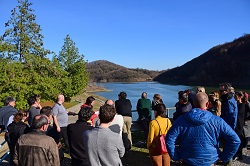For successful river basin adaptation planning, just add stakeholders
The Mediterranean region faces increased water scarcity, and even drought, driven by changes in land use, demographics and the climate. If the region is to avoid the ensuing socioeconomic losses and environmental impacts, there is a pressing need for effective and sustainable water management practices. The recently completed and EU-funded BEWATER project recognised that successful adaptation measures require efforts that go beyond raising public awareness. Therefore, BEWATER developed plans embedded with shared responsibility and active community participation. This shifted the focus from technocratic solutions to those that were stakeholder driven, drawing on local experience and knowledge. Adaptation from the bottom-up BEWATER researchers worked with the project stakeholders to create River Basin Adaptation Plans (RBAP) for the four selected case study locations: Tordera (Spain), Pedieos (Cyprus), Rmel (Tunisia) and Vipava (Slovenia). In total the group identified and formulated 102 water management options. As the project coordinator Ms Anabel Sanchez recalls, ‘The stakeholders identified shared challenges, related to water quantity and quality. But owing to divergent environmental, socio-economic and political conditions, solutions differed. The Pedieos and Vipava basins had a preference for awareness campaigns and increased hydrological knowledge. Tordera basin preferred ecosystem-based green options and prevention of water resources over-exploitation. Whereas the Rmel basin looked to improve infrastructure and new technologies or income generation activities.’ To engage participants, BEWATER adopted the Stakeholder Integrated Research (STIR) approach, specifically tailored to climate change adaptation. Guided by STIR, stakeholders for each river basin were identified using the Criteria-Quota-Individuals method, which ensured sufficient group diversity, in terms of their areas of expertise (agriculture, infrastructure, water, environment, energy, forest management), organisational affiliations (business and economy; government and public authorities; civil society; practitioners) and gender. The participatory process included activities such as Fuzzy Cognitive Mapping for reference models capturing basin dynamics and Multi-Criteria Analysis to prioritise proposals and implementation options. Participatory modelling tools and multi-criteria analysis were used to assess the impacts of the options and the stakeholder preferences. As Ms Sanchez puts it, ‘These methodologies were easy to work with for the stakeholders as they were active, with lots of hands-on work, so we successfully avoided one-directional science communication.’ Ensuring sustainability To ensure the retention and transfer of knowledge, BEWATER facilitated regular transnational meetings and events. Partners, along with key stakeholders from each basin, shared lessons learned, knowledge on water governance and management issues, as well as the challenges and success of overall project implementation. Additionally, the team compiled a freely available handbook that provides guidelines outlining the considerations and steps necessary to design a river basin adaptation plan using a scientific participatory process. In terms of the sustainability of the BEWATER adaptation plans, Ms Sanchez stresses that, ‘It was important to make the project relevant to local policy development and to anchor the adaptation planning within ongoing political processes, fostering ownership and leadership amongst the decision makers responsible for implementation.’ The team have already participated as stakeholders in the evaluation of the EU Climate Change Adaptation Strategy and contributed content to the Climate-Adapt platform. The involvement of a wide range of stakeholders from governmental and non-governmental organisations and from different sectors (water, agriculture, forestry, environment, urban planning, education etc.) enabled the creation of a broad set of adaptation options, some of which are currently at the planning or implementation stage. Indeed, looking further afield Ms Sanchez suggests that, ‘Results and guidance from BEWATER’s participatory approach may be useful for the development of wider environmental policies, such as resource management, that benefit from the contribution of citizen decision making, ultimately building more resilient territories.’







